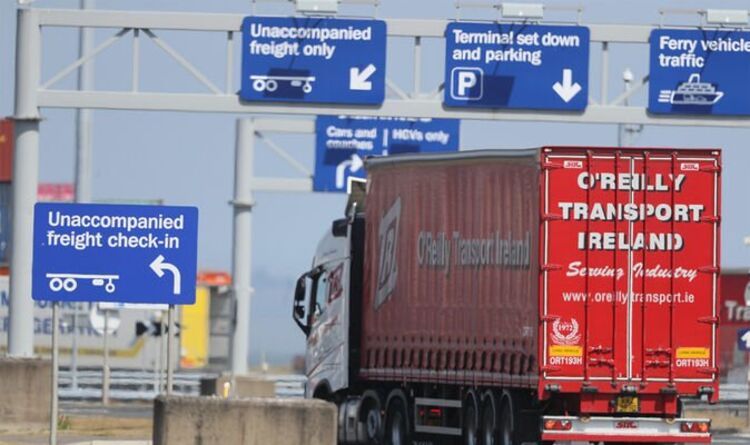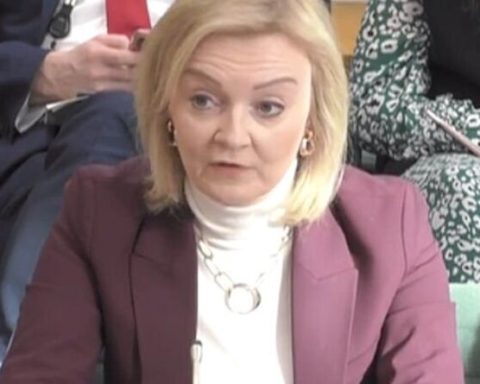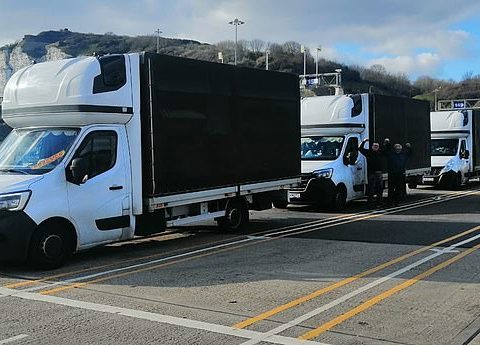Under the Brexit trade deal, Northern Ireland retains access to the EU single market but has to use the bloc’s customs standards with imports and exports to the rest of the UK. The Northern Ireland Protocol has caused outrage in the country, with unionists demanding it is overturned due to its impacts on trade within Britain.
Now, the Jewish community in Northern Ireland “are unable to access kosher goods” as a result of the Protocol.
A Whitehall source claimed Jewish people in the country are “literally struggling to practise their faith due to the protocol, and we have to address that”.
Northern Ireland has a small Jewish community, with reports from 2019 suggesting there are just 76 members of the only Northern Ireland synagogue, in north Belfast.
There has not been a kosher butcher in the UK jurisdiction for many years, so supplies are sourced from England.
According to Jewish News, only three deliveries of kosher goods were sent to Northern Ireland in 2021.
Michael Black, chairman of the Belfast Jewish Community, said: “The problems started with the protocol, which the government signed.
“For us, all sorts of red tape and bureaucracy was introduced, and we got caught up in bigger issues. Even with the grace periods, it has been a problem.
“There is still paperwork. Our suppliers are small businesses. We are not a very big customer.
“Similarly, with the carrier. One pallet every eight or 10 weeks is not meaningful.
“Both the carrier and the suppliers wince when we make a phone call. It is not an attractive proposition to them.”
READ MORE: Brexit LIVE: Boris unleashes TWO new secret weapons
According to Jewish News, only three deliveries of kosher goods were sent to Northern Ireland in 2021.Michael Black, chairman of the Belfast Jewish Community, said: “The problems started with the protocol, which the government signed.“For us, all sorts of red tape and bureaucracy was introduced, and we got caught up in bigger issues. Even with the grace periods, it has been a problem.“There is still paperwork. Our suppliers are small businesses. We are not a very big customer.“Similarly, with the carrier. One pallet every eight or 10 weeks is not meaningful.“Both the carrier and the suppliers wince when we make a phone call. It is not an attractive proposition to them.”
Speaking to the Telegraph, the Whitehall source said the Government is concerned about the inability for Northern Ireland’s Jewish population to access kosher food.
However, Government sources told the outlet the war in Ukraine has curbed Boris Johnson’s ability to trigger Article 16 before the Stormont elections in May.
The Prime Minister is “unlikely” to deploy the safeguard mechanism in the Northern Ireland Protocol, which would suspend “disruptive” post-Brexit trade rules governing the province, before the Assembly vote.
Mr Johnson, facing increasing pressure from senior Tory Brexiteers and Unionist parties, told MPs last month: “If our friends don’t show the requisite common sense, then of course we will trigger Article 16.”
DON’T MISS
Many in Government believe the window to trigger Article 16 this side of May 5 closes on March 26, when the province enters the pre-ballot “purdah” period.
A senior government source told The Telegraph: “Before the Ukraine war, it was more likely that we could have triggered Article 16 before ‘purdah’ kicks in.
“But now it’s looking pretty uncertain. The whole of Government is entirely focused on the Ukraine war – there’s very little ministerial capacity for anything else.”
On Thursday, a Number 10 official said triggering Article 16 had not been ruled out, adding: “If necessary, we would do it in ‘purdah’ if the situation requires – it’s not ideal, but could still happen.”
It comes after the DUP threatened that it wouldn’t allow Northern Ireland’s power-sharing government to be revived unless the EU abandons its requirement for checks on British goods arriving in the country.
Edwin Poots, DUP agriculture minister, said in February: “Someone in Europe needs to wake up to the reality that they are not doing this to assist the peace process.
“The political element of the peace process has had a bomb put in it, and it hasn’t been by terrorists, it has been by the European Union.”




